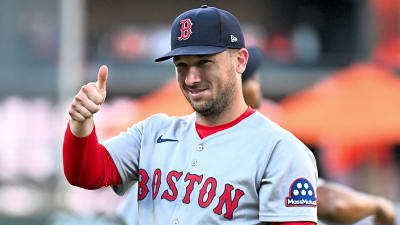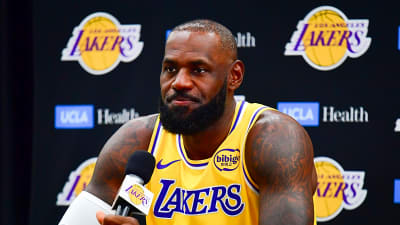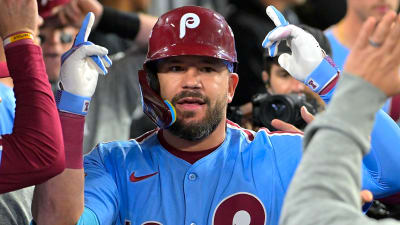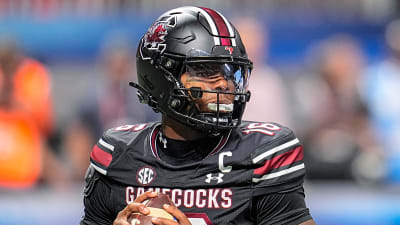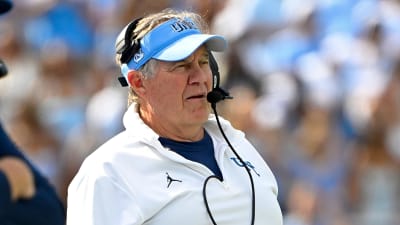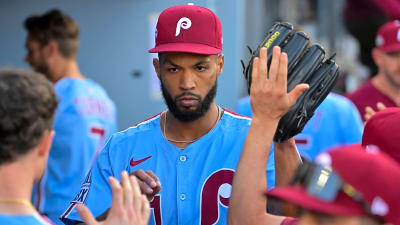- Home
- Quizzes
- My Quiz Activity
- Newsletters
- MY FAVORITES
- Add Sports/Teams
- SPORTS
-
NFL
- NFL Home
- Arizona Cardinals
- Atlanta Falcons
- Baltimore Ravens
- Buffalo Bills
- Carolina Panthers
- Chicago Bears
- Cincinnati Bengals
- Cleveland Browns
- Dallas Cowboys
- Denver Broncos
- Detroit Lions
- Green Bay Packers
- Houston Texans
- Indianapolis Colts
- Jacksonville Jaguars
- Kansas City Chiefs
- Las Vegas Raiders
- Los Angeles Chargers
- Los Angeles Rams
- Miami Dolphins
- Minnesota Vikings
- New England Patriots
- New Orleans Saints
- New York Jets
- New York Giants
- Philadelphia Eagles
- Pittsburgh Steelers
- San Francisco 49ers
- Seattle Seahawks
- Tampa Bay Buccaneers
- Tennessee Titans
- Washington Commanders
-
MLB
- MLB Home
- Athletics
- Arizona Diamondbacks
- Atlanta Braves
- Baltimore Orioles
- Boston Red Sox
- Chicago White Sox
- Chicago Cubs
- Cincinnati Reds
- Cleveland Guardians
- Colorado Rockies
- Detroit Tigers
- Houston Astros
- Kansas City Royals
- Los Angeles Angels
- Los Angeles Dodgers
- Miami Marlins
- Milwaukee Brewers
- Minnesota Twins
- New York Yankees
- New York Mets
- Philadelphia Phillies
- Pittsburgh Pirates
- San Diego Padres
- San Francisco Giants
- Seattle Mariners
- St. Louis Cardinals
- Tampa Bay Rays
- Texas Rangers
- Toronto Blue Jays
- Washington Nationals
-
NBA
- NBA Home
- Atlanta Hawks
- Boston Celtics
- Brooklyn Nets
- Charlotte Hornets
- Chicago Bulls
- Cleveland Cavaliers
- Dallas Mavericks
- Denver Nuggets
- Detroit Pistons
- Golden State Warriors
- Houston Rockets
- Indiana Pacers
- Los Angeles Clippers
- Los Angeles Lakers
- Memphis Grizzlies
- Miami Heat
- Milwaukee Bucks
- Minnesota Timberwolves
- New Orleans Pelicans
- New York Knicks
- Oklahoma City Thunder
- Orlando Magic
- Philadelphia 76ers
- Phoenix Suns
- Portland Trail Blazers
- Sacramento Kings
- San Antonio Spurs
- Toronto Raptors
- Utah Jazz
- Washington Wizards
-
NHL
- NHL Home
- Anaheim Ducks
- Boston Bruins
- Buffalo Sabres
- Calgary Flames
- Carolina Hurricanes
- Chicago Blackhawks
- Colorado Avalanche
- Columbus Blue Jackets
- Dallas Stars
- Detroit Red Wings
- Edmonton Oilers
- Florida Panthers
- Los Angeles Kings
- Minnesota Wild
- Montreal Canadiens
- Nashville Predators
- New Jersey Devils
- New York Islanders
- New York Rangers
- Ottawa Senators
- Philadelphia Flyers
- Pittsburgh Penguins
- San Jose Sharks
- Seattle Kraken
- St. Louis Blues
- Tampa Bay Lightning
- Toronto Maple Leafs
- Utah Mammoth
- Vancouver Canucks
- Vegas Golden Knights
- Washington Capitals
- Winnipeg Jets
- NCAAF
- NCAAM
- Olympics
- Boxing
- Entertainment
- Lifestyle
- Golf
- MMA
- Soccer
- Tennis
- Wrestling
- Sports Betting
- More Sports
- RESOURCES
- My Account
- YB on Facebook
- YB on Twitter
- YB on Flipboard
- Contact Us
- Privacy Policy
- Terms of Service
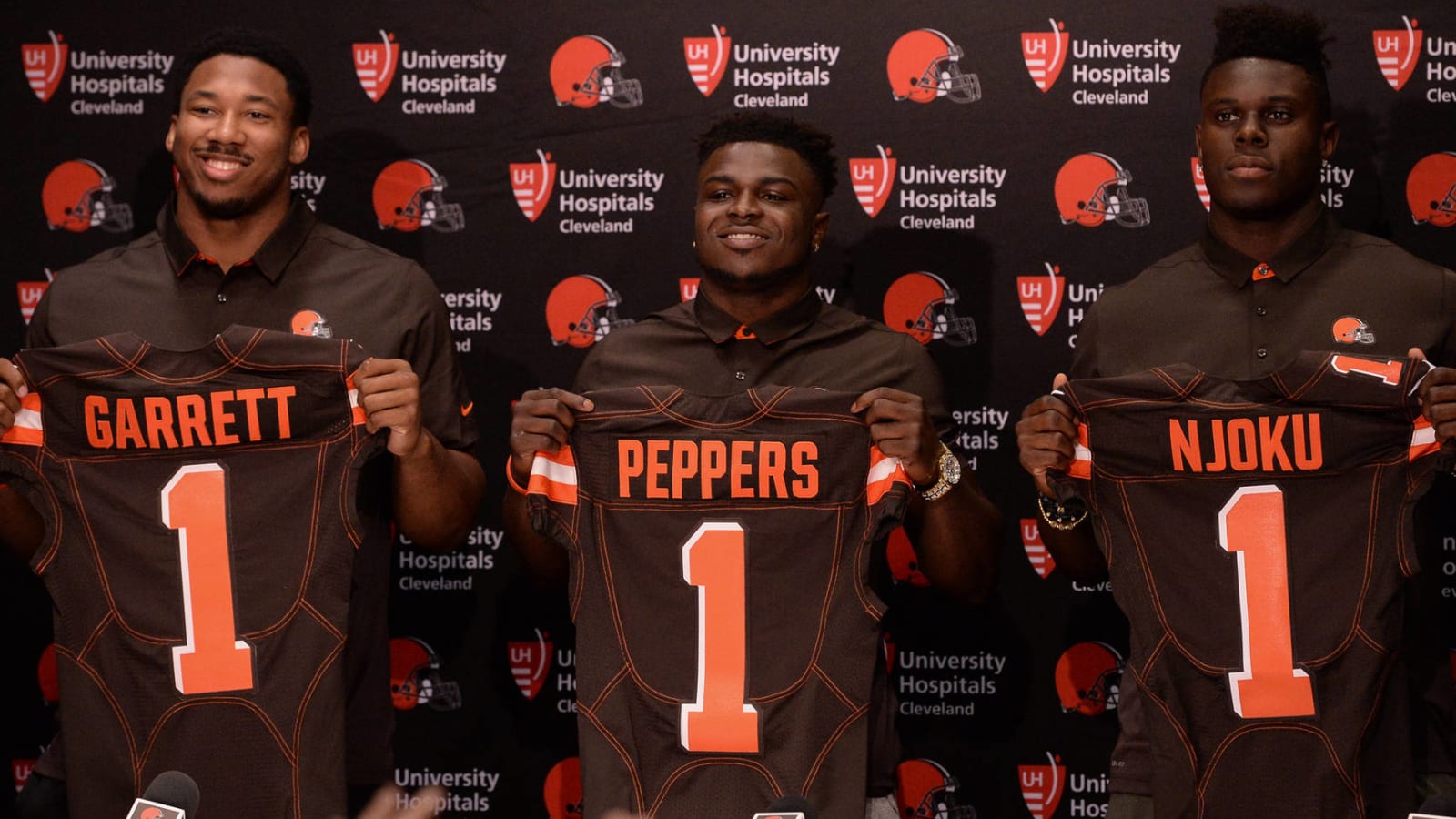
NFL teams that have made three or more first-round picks in one draft
The Dolphins acquired three first-round picks in 2020's virtual draft. While they follow the Raiders and Giants, who made three first-round selections in 2019, there have been more than 20 instances of franchises holding at least three first-round selections in a single draft over the past 78 years. Here's how those teams' decisions worked out.
NFL teams that have made three or more first-round picks in one draft

The Dolphins have already acquired three first-round picks in the 2020 draft. While they follow the Raiders and Giants, who did this in 2019, there have been more than 20 instances of franchises holding at least three first-rounders in a single draft over the past 78 years. Here's how those teams' decisions worked out.
New York Giants, 2019

Perhaps the most scrutinized draft on this list, the only three-pick first round in Giants history began to take shape when GM Dave Gettleman pulled the trigger on an Odell Beckham Jr. trade he denied was brewing. That gave the Giants the No. 17 pick, which became promising defensive lineman Dexter Lawrence. But both Lawrence and the No. 30 pick, cornerback Deandre Baker, escaped radars after the Daniel Jones selection shocked viewers. The Duke product delivered an up-and-down rookie season, throwing 24 TD passes (fourth-most ever for a rookie) in just 12 starts but fumbled an NFL-high 18 times ( fifth-most in a season).
Oakland Raiders, 2019

In Jon Gruden's first year back in power in Oakland, the Raiders traded Khalil Mack and Amari Cooper for picks that landed in the 20s. Oakland began by taking Clemson defensive end Clelin Ferrell at No. 4 overall, which surprised given Ferrell's mid-Round 1 grades. The first leg of the Mack haul turned into Josh Jacobs at No. 24. Jacobs' 1,150 rushing yards (in 13 games) set a Raider rookie record. The Cooper trade brought safety Johnathan Abram at No. 27. Abram starred on "Hard Knocks" but missed 15 games as a rookie. He remains a key part of the franchise's future in Las Vegas.
Cleveland Browns, 2017

Seeking QB stability since rebooting in 1999, the Browns passed on Carson Wentz in 2016 and Deshaun Watson in 2017. In the Wentz trade, Cleveland added a second 2017 first-rounder, which was traded to the Texans in the Watson move. Although ownership pushed for Mitch Trubisky at No. 1 overall, the Hue Jackson-Sashi Brown team started the '17 draft with Myles Garrett. After the Browns moved out of No. 12 (Watson), they drafted Jabrill Peppers, (traded in the 2019 Odell Beckham Jr. deal). The Browns moved back into the first round to take David Njoku. No final grade yet, but Garrett's and Njoku's stock dropped in 2019.
Minnesota Vikings, 2013

Trading Percy Harvin to Seattle landed Minnesota a second first-round choice. After the Vikings took defensive tackle Sharrif Floyd at No. 23, the Harvin-generated pick ended up at No. 25 (CB Xavier Rhodes). GM Rick Spielman then sent four picks to the Patriots to move back into Round 1 for Cordarrelle Patterson at 29. Floyd encountered health problems and is out of the league. The well-traveled Patterson did not pan out as a Vikings wideout but became an All-Decade return man. None of these players remains with the Vikes, who made Rhodes a cap casualty after the former All-Pro's play cratered in 2019.
St. Louis Rams, 2001

The Rams entered this draft with three picks, obtaining the extra first-rounders after sending Trent Green to the Chiefs and defensive end Kevin Carter to the Titans earlier in 2001. The Green deal occurred on draft eve, and it sent the No. 12 overall pick — defensive end Damione Lewis — to St. Louis. The Rams chose safety Adam Archuleta with their own pick, No. 20, and took another defensive lineman — Ryan Pickett — at 29. Pickett became better known for his Packers work and played 14 seasons, while Lewis was a decent Ram for six years. Though Archuleta started in Super Bowl XXXVI, he played just five Rams seasons.
New York Jets, 2000

This was the only time in the draft's 84-year history that a team has made four first-round picks. Two of them came the Jets' way because of the April Keyshawn Johnson deal , with the Bucs sending two first-rounders in the same draft for the wideout. The Bill Parcells-run Jets acquired the fourth pick from the Patriots for Bill Belichick's rights. With the choices, Gang Green did well, drafting D-line anchors Shaun Ellis and John Abraham (Nos. 12-13), six-year starting QB Chad Pennington with their own pick (No. 18) and tight end Anthony Becht at 27. Ellis and Abraham sit second and third on the Jets sack list; Pennington piloted the team to three playoff berths.
Carolina Panthers, 1995

Kerry Collins, Tyrone Poole and Blake Brockermeyer combined to play 39 seasons. Unfortunately, none made it to 1999 with Carolina. The Panthers won a coin flip to hold 1995's No. 1 pick over the Jaguars but traded it to the Bengals. At No. 5, Carolina took Collins. Wheeling and dealing sent Poole, a cornerback, and Brockermeyer, a tackle, to Carolina at Nos. 22 and 29. The Panthers traded Poole to the Colts in 1998; he played until 2008 and won two Super Bowls as a Patriot. Brockermeyer signed with the Bears in 1999. Alcohol issues led to Collins being waived in 1998; he started for two No. 1-seeded teams and in Super Bowl XXXV before retiring in 2012.
Dallas Cowboys, 1991

1989's Herschel Walker bombshell trade gave the Cowboys nine picks; two of those were first- and second-rounders in 1991. Dallas used one of those choices as ammo to move into the No. 1 slot, taking defensive tackle Russell Maryland. Dallas' own pick became wide receiver Alvin Harper, and the Jimmy Johnson-Jerry Jones tandem selected D-lineman Kelvin Pritchett but flipped him to the Lions for three 1991 picks soon after. Maryland and Harper became mainstays for Dallas' '90s dynasty, with Maryland making one Pro Bowl. Harper defected to Tampa Bay as a free agent in 1995. Pritchett outlasted both, playing until 2004, just never for the Cowboys.
Los Angeles Raiders, 1988

One of the best players in Raiders history, Tim Brown, went to Los Angeles via 1988's No. 6 pick. The Raiders added defenders Terry McDaniel and Scott Davis at Nos. 9 and 25. The McDaniel pick first surfaced in an Oilers-Rams 1986 trade that sent Jim Everett to L.A., and the Oilers dealt it to L.A.'s other team two years later in a deal that gave Houston promising defensive end Sean Jones. For Davis, a seven-year linebacker, the Raiders traded former starting wideout Dokie Williams and two picks to the 49ers. (Williams never played in San Francisco.) McDaniel became a five-time Pro Bowl corner with the Raiders. You may have heard about Brown's career.
Cincinnati Bengals, 1984

Two of the three picks the Bengals made in 1984 were non-factors, but one of them indirectly helped build an AFC champion. The Bengals took linebacker Ricky Hunley, nose tackle Pete Koch and tackle Brian Blados at Nos. 7, 16 and 28. But Hunley held out and forced a trade, and the Broncos dealt the Bengals first- and third-round 1986 picks that became longtime starters Tim McGee and David Fulcher. Hunley played on two Denver Super Bowl teams but was out of the league by 1991. Blados became a seven-year Bengal, starting at right tackle in Super Bowl XXIII. Koch played only one season with Cincinnati.
San Diego Chargers, 1983

Each member of the Chargers' 1983 Round 1 trio took roundabout routes to San Diego. A dispute with future Hall of Fame defensive end Fred Dean led to a 1981 Chargers-49ers trade, with the deal allowing the Bolts to swap first-round picks with the 49ers. San Diego did so in '83, taking linebacker Billy Ray Smith at No. 5. The 49ers then held pick 22, but the Bolts traded back up for the right to take cornerback Gill Byrd. San Diego's original pick, running back Gary Anderson, spent two years in the USFL before joining the team in 1985. Smith and Byrd played 10 Bolts seasons; the latter's 42 INTs are a franchise record. A dual-threat back, Anderson played nine seasons — four as a Charger.
Cincinnati Bengals, 1977

The Bengals used top-end resources to bolster their defensive line in 1977, taking Eddie Edwards and Wilson Whitley at Nos. 3 and 8. Both were starters on Cincinnati's Super Bowl XVI team. The Bengals also took tight end Mike Cobb at No. 22. The Bengals created a void up front by trading defensive end Sherman White to the Bills in 1976; that pick wound up third in '77. The Bengals sending Pro Bowl linebacker Bill Bergey to the Eagles landed them the No. 8 pick. A 12-year Bengal who became a prolific sack artist, Edwards' 158 starts are ninth in team history. Whitley was a six-year Bengal and full-time starter.
New England Patriots, 1976

Jim Plunkett did not work out in New England, but the quarterback netted the Patriots two additional first-rounders upon being traded to the 49ers. The Pats' own pick from this draft, All-Pro cornerback Mike Haynes (No. 5), was their best. But six-year safety starter Tim Fox and 13-year center contributor Pete Brock came by way of the Plunkett deal. Fox made the Pro Bowl in 1980, while Brock started alongside John Hannah in each of the Pats' four 1985 playoff games. The Patriots traded Haynes to the Raiders in 1983, giving the team a 1984 first-rounder in return for the future Hall of Famer.
Los Angeles Rams, 1975

From Roman Gabriel to John Hadl to Pat Haden to Vince Ferragamo, the Rams went through many QB1s in the 1970s. They managed to acquire first-round picks for Gabriel and Hadl in the same draft, using it to restock their lines. Los Angeles selected offensive linemen Dennis Harrah (via the 1973 Gabriel trade with the Eagles) and Doug France while also adding defensive lineman Mike Fanning (via the '74 Hadl trade with the Packers). Harrah made five Pro Bowls and lasted 13 seasons, helping Eric Dickerson to the single-season rushing record in 1984. France and Fanning each were seven-year Rams.
New England Patriots, 1973

The 1972 Patriots sported the sixth-worst point differential in NFL history (minus-254) but only landed the No. 4 pick. It panned out. John Hannah became the greatest player of the Patriots' first 40 years. The Pats did well at No. 12, taking 10-year running back Sam "Bam" Cunningham. The Giants traded defensive end (and future actor) Fred Dryer to the Pats, but he refused to report without a lucrative extension. The Pats dealt Dryer to the Rams for the No. 12 pick. The third of the picks, No. 19 (wideout Darryl Stingley), was acquired in a trade with the Bears. Hannah's seven first-team All-Pros are the most in Pats history; the guard played until the team's 1985 Super Bowl season. A five-year starter, Stingley was paralyzed during a 1978 preseason game.
Los Angeles Rams, 1969

This draft did not have the impact the Rams would have liked, but the team landed two additional first-rounders for players not part of their future. Los Angeles traded eventual 16-year off-and-on starting quarterback Bill Munson to the Lions in 1968 for what became the No. 8 pick, and the Rams dealt lower-profile QB Gary Beban to the Redskins for the No. 10 choice. Those picks became running back Larry Smith and wideout Jim Seymour. Neither panned out. The Rams' own selection, No. 21 (tight end Bob Klein), started six Rams seasons in an 11-year career.
Minnesota Vikings, 1967

The NFC rosters at the 1969 and '70 Pro Bowls featured two wide receivers named Gene Washington: one a Viking and one a 49er. The Vikings landed their Gene in this draft, but that's not what their 1967 haul is best remembered for. Minnesota made a former No. 1 overall pick, running back Tommy Mason, the centerpiece in a package sent to the Rams for the 1967 No. 15 choice. That became Alan Page. Minnesota drafted running back Clint Jones, over Hall of Famer Floyd Little, at No. 2 overall and added Washington at No. 8. Both skill-position players had roles for a few quality Vikings squads. Page anchored the Purple People Eaters defensive line, en route to becoming an all-time great.
Chicago Bears, 1965

Undoubtedly the best work of any team on this list, the Bears landed two of the NFL's greatest players on back-to-back picks. The Steelers enabled this, trading to the Bears what turned out to be 1965's No. 3 overall pick for second- and fourth-rounders (Nos. 28 and 51) in 1964. Chicago chose Dick Butkus, a member of two All-Decade teams and one of the league's most celebrated talents. With their own pick (No. 4), the Bears took Gale Sayers, a running back so good that he was a first-ballot Hall of Famer despite playing only 68 games. Even with No. 6 pick Steve DeLong opting for the AFL's Chargers, this was an iconic draft haul.
San Francisco 49ers, 1961

The pre-dynasty Steelers helped another Hall of Famer head elsewhere with a trade involving a Round 1 pick. The 49ers acquired 1961's No. 6 pick for safety Dicky Moegle in March 1960 and chose Hall of Fame cornerback Jimmy Johnson with it. The 49ers did well in this three-man first round, adding starting wideout Bernie Casey with their own pick (No. 9) and traded a 1958 24th-round pick (tight end Dee Mackey) for 1961's No. 11 slot. That became Billy Kilmer, who played 18 NFL seasons — mostly at QB in other cities. En route to the Hall of Fame, Johnson played 16 years and was an All-Pro during the 49ers' early-1970s contender run. Moegle played one year in Pittsburgh.
Chicago Bears, 1951

This Bears draft can be viewed as a missed opportunity. Chicago chose Notre Dame quarterback Bob Williams at No. 2 overall. A pick later, the 49ers drafted Hall of Famer Y.A. Tittle. The Bears got only seven starts out of Williams. Twenty-eight members of the first Baltimore Colts franchise were placed in the 1951 draft, as the team disbanded, and Chicago landed a running back off the former All-American Football Conference franchise's roster in Billy Stone. The Bears chose end Gene Schroeder at No. 12. Schroeder made one Pro Bowl, but these three players were out of the NFL by 1958.
Chicago Bears, 1941

Amid an all-time dominant run, the defending champion Bears became the first team in the draft era (1936-present) to make three first-round selections. None of the players lasted long in Chicago, partially because of the United States' involvement in World War II, but one of the picks (fullback Norm Standlee) made a big impact on the Bears' 1941 NFL champion team. The Bears obtained the No. 3 pick from the Steelers in a 1940 trade. Standlee's 414 rushing yards ranked fourth in '41; he scored twice in the Bears' championship-game blowout of the Giants. He joined the AAFC's 49ers after the war. Neither No. 1 pick Tom Harmon nor No. 9 choice Don Scott played a Bears down.
Sam Robinson is a sportswriter from Kansas City, Missouri. He primarily covers the NFL for Yardbarker. Moving from wildly injury-prone sprinter in the aughts to reporter in the 2010s, Sam set up camp in three time zones covering everything from high school water polo to Division II national championship games
More must-reads:
- Aaron Rodgers sends message to Steelers after disappointing loss to Bengals
- Kevin Stefanski storyline debunked ahead of Browns-Dolphins game
- The 'Oldest starting QB by NFL team' quiz
Breaking News
Trending News
Customize Your Newsletter
 +
+
Get the latest news and rumors, customized to your favorite sports and teams. Emailed daily. Always free!
PRIVACY POLICY EDITORIAL POLICY CONTACT US
ABOUT YARDBARKER TERMS OF SERVICE
Use of this website (including any and all parts and
components) constitutes your acceptance of these
Terms of Service and Privacy Policy.
This site is for entertainment purposes only.
There is no gambling offered on this site.
Gambling Problem? Call 1-800-Gambler.

